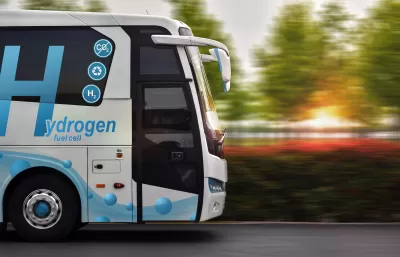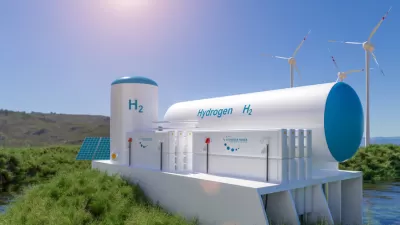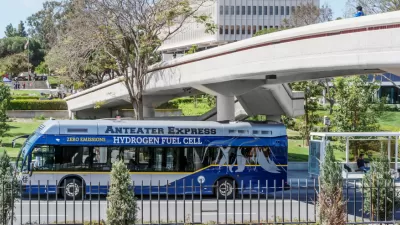More work is necessary to make hydrogen fuel cost competitive with gasoline and diesel and ensure it delivers on its zero-emission promise, new report says.

More work is necessary to make hydrogen fuel cost competitive with gasoline and diesel and ensure it delivers on its zero-emission promise.
A new report from Information Technology and Innovation Foundation (ITIF) concludes hydrogen fuel may not be as feasible as a fossil fuel replacement as previously hoped. Writer Skip Descant summarizes the report’s findings in a recent article for Government Technology.
“In recent years hydrogen has been explored and advocated in much the same fashion as battery-electric technology for cars, trucks, and host of other vehicles,” Descant writes. But its fossil fuel-heavy production methods and complicated storage and distribution network currently make it too expensive to replace gasoline and diesel–and counteract its carbon neutral claims.
Though hydrogen power produces no harmful greenhouse gases (GHG) when it’s used, 98 percent of hydrogen produced today relies on fossil-fuel heavy production methods, according to the ITIF report, titled A Realist Approach to Hydrogen.
“The economies of scaling this type of hydrogen production are currently not feasible, the report concluded,” writes Descant. For hydrogen fuel to reach its full green potential and become price competitive, wind and solar power generation will need to be expanded to the point that they are creating surplus that can be used for hydrogen production, experts say.
The report authors point out their findings should not be taken as a criticism of green energy or denial of climate change. They call for additional research and development of new technologies to make the cost of clean fuels like hydrogen competitive, which they say is crucial for a successful “green transition.”
FULL STORY: Hydrogen Is Still a Heavy Lift for Clean Transportation

Alabama: Trump Terminates Settlements for Black Communities Harmed By Raw Sewage
Trump deemed the landmark civil rights agreement “illegal DEI and environmental justice policy.”

Planetizen Federal Action Tracker
A weekly monitor of how Trump’s orders and actions are impacting planners and planning in America.

The 120 Year Old Tiny Home Villages That Sheltered San Francisco’s Earthquake Refugees
More than a century ago, San Francisco mobilized to house thousands of residents displaced by the 1906 earthquake. Could their strategy offer a model for the present?

LA’s Tree Emergency Goes Beyond Vandalism
After a vandal destroyed dozens of downtown LA trees, Mayor Karen Bass vowed to replace them. Days later, she slashed the city’s tree budget.

Sacramento Leads Nation With Bus-Mounted Bike Lane Enforcement Cameras
The city is the first to use its bus-mounted traffic enforcement system to cite drivers who park or drive in bike lanes.

Seattle Voters Approve Social Housing Referendum
Voters approved a corporate tax to fund the city’s housing authority despite an opposition campaign funded by Amazon and Microsoft.
Urban Design for Planners 1: Software Tools
This six-course series explores essential urban design concepts using open source software and equips planners with the tools they need to participate fully in the urban design process.
Planning for Universal Design
Learn the tools for implementing Universal Design in planning regulations.
Ada County Highway District
Clanton & Associates, Inc.
Jessamine County Fiscal Court
Institute for Housing and Urban Development Studies (IHS)
City of Grandview
Harvard GSD Executive Education
Toledo-Lucas County Plan Commissions
Salt Lake City
NYU Wagner Graduate School of Public Service





























